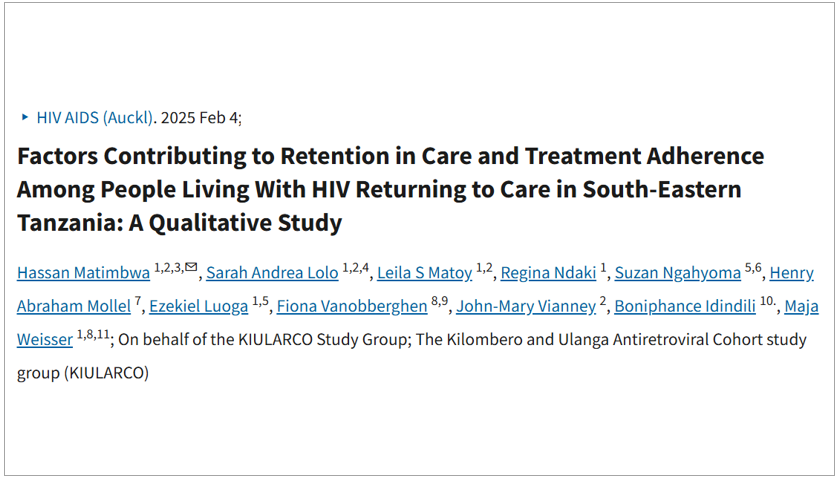
HIV CARE: Why do people living with the virus stop, restart treatment?

Ensuring that people living with HIV (PLHIV) remain in care and adhere to antiretroviral therapy (ART) is vital for their well-being and the success of HIV treatment programs. However, treatment interruptions remain a major challenge, especially in rural areas.
A recent study by Ifakara Health Institute scientists underlines the need for healthcare systems to strengthen interventions that support lifelong treatment adherence. This recommendation follows a research conducted in rural southeastern Tanzania, which examined factors influencing dropout, return, retention in care, and adherence among PLHIV. The study provides insights into how healthcare systems can better support these individuals.
Published on the HIV/AIDS journal, the study was conducted between July and October 2023. It involved in-depth interviews and focus group discussions with healthcare workers and treatment supporters from St. Francis Regional Referral Hospital (SFRRH) and Kibaoni Health Center, alongside 21 PLHIV.
Why do PLHIV stop treatment?
The study identified several key reasons why PLHIV stopped attending clinics and discontinued taking ART. Fear of disclosure was a major concern, as many worried about stigma and discrimination if their HIV status became known. Others stopped taking medication when they felt better, assuming they no longer needed it.
Some struggled with accepting their diagnosis, leading to treatment non-adherence, while work-related absences, particularly among farmers and migrant workers, also contributed to missed appointments. Additionally, religious beliefs played a role, with some individuals turning to faith-based healing instead of medical treatment.
What encourages PLHIV to return to care?
Despite these challenges, many PLHIV eventually return to care, often when their health deteriorates and symptoms reappear. Outreach efforts from healthcare providers also play a role in re-engagement. Many PLHIV reported that being contacted by healthcare providers reminded them of the importance of treatment and motivated them to return.
Social support is another crucial factor, as PLHIV who resumed treatment cited encouragement from a spouse, parent, or close friend as a key motivator.
How do we keep people in care?
The study found that several factors contribute to long-term ART adherence. Counseling and health education help PLHIV understand their condition and the necessity of consistent treatment. Trust in healthcare providers also emerged as a significant factor—patients who felt respected and valued by their doctors and nurses were more likely to remain in care.
The study also highlights how flexible treatment models, such as multi-month prescription refills, can reduce clinic visits and make adherence more convenient, benefiting both patients and healthcare facilities while decentralizing ART services through community distribution points could also make treatment more accessible for those in remote areas.
Recommendations for strengthening HIV care
The study underscores the persistent stigma surrounding HIV, which remains a major barrier to continuous care. To improve retention, the study calls for proactive healthcare interventions, community-driven stigma reduction efforts, and more flexible treatment options.
“Our study highlights persisting stigmatization contributing to dropping from care, with strong family and social support improving adherence and clinic attendance.”
“Future interventions should focus on these factors to enhance retention of lifelong treatment adherence. Working obligations remain a challenge, that could be addressed by facilitated access to remote drug pickup.”
Ultimately, ensuring that PLHIV remain on ART is not just a medical goal—it requires a collective effort from healthcare providers, communities, and policymakers. Compassion and understanding are essential in keeping PLHIV engaged in care and improving their well-being.
Ifakara’s Hassan Matimbwa is lead author
This study was led by Ifakara scientist Hassan Matimbwa who worked in close collaboration with colleagues within the Kilombero and Ulanga Antiretroviral Cohort study group (KIULARCO) of Ifakara and the Chronic Disease Clinic of Ifakara (CDCI).
Additional contributors include experts from Mzumbe University, the Benjamin Mkapa Foundation, Swiss TPH, the University of Basel, University Hospital Basel, and Kampala International University.
Read the publication, here.
